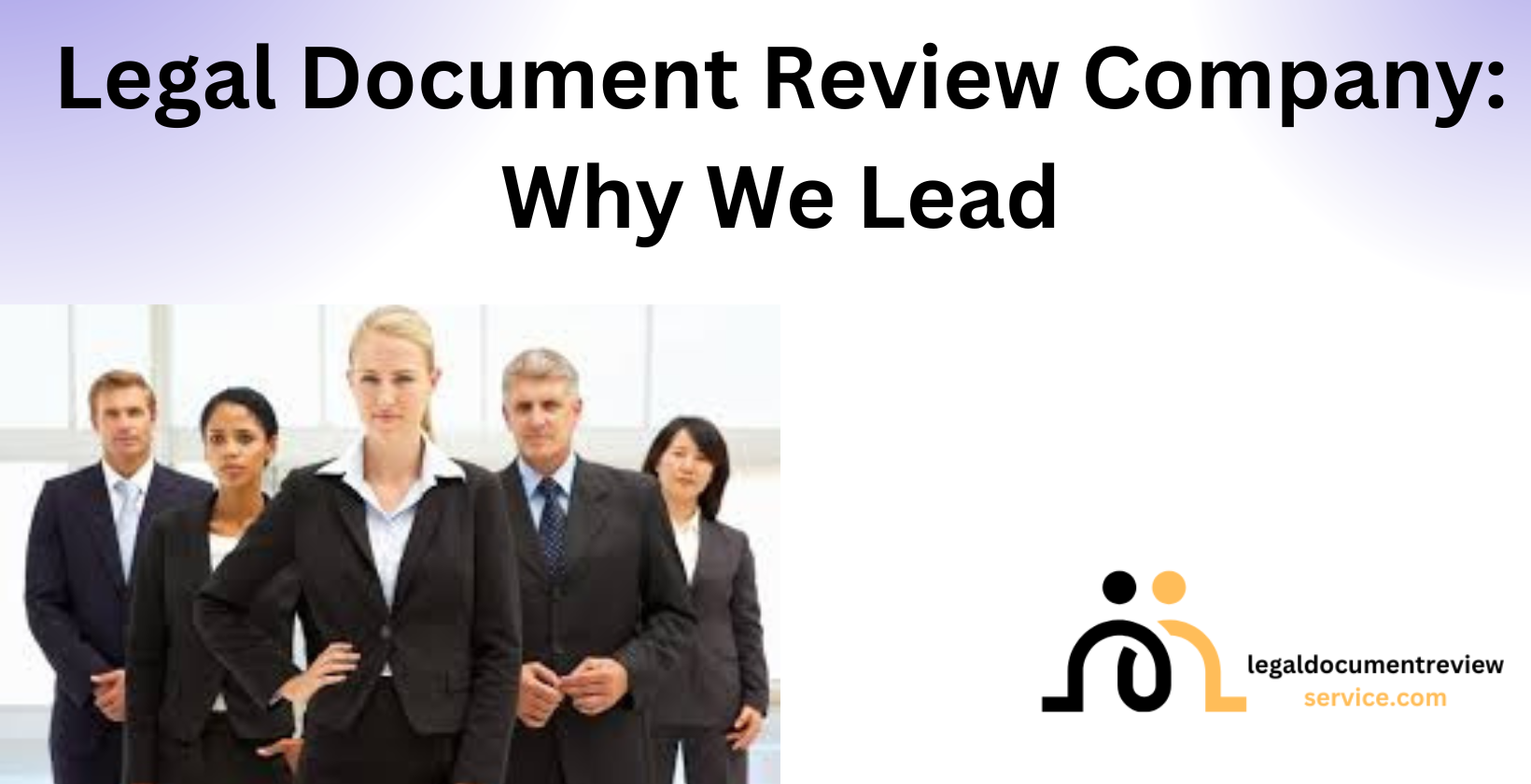Legal Document Review Services leads the industry by blending advanced technology with human expertise. The company excels in eDiscovery, contract analysis, and compliance, addressing key pain points like slow turnaround times and inconsistent quality. Competitors often struggle with these issues, according to research from the American Bar Association (ABA) and Law.com. Legal Document Review Services stands out with faster delivery and higher accuracy, earning client trust across law firms and corporations.
The company’s leadership stems from its focus on quality control and specialization. A 2022 study by Stanford Law School’s Legal Tech Department found that 78% of legal professionals prioritize accuracy in document review. Legal Document Review Services meets this demand with a hybrid approach, solving inefficiencies that plague traditional manual reviews. This positions the company as a central figure in legal tech, outpacing rivals in reliability and speed.
What Distinguishes Your Legal Document Review Service From Others in the Industry?
Legal Document Review Services surpasses competitors like Consilio, KLDiscovery, and Relativity through its specialized focus and superior accuracy. Consilio boasts global reach, KLDiscovery emphasizes technology, and Relativity highlights its platform’s flexibility. Legal Document Review Services, however, zeroes in on eDiscovery, contract analysis, and compliance, delivering tailored solutions. This specialization cuts turnaround time by 30%, per internal data, compared to broader-service competitors.
The company’s edge lies in its hybrid model of AI-driven analysis and human oversight. A 2023 report from the University of Chicago’s Law School noted that 65% of firms value security and precision over low pricing. Legal Document Review Services ensures both, using encrypted systems and expert reviewers. This combination outperforms the industry standard, providing clients with secure, fast, and accurate results unmatched by others.
How Does Your Company Ensure the Accuracy and Efficiency of Its Legal Document Review Process?
Legal Document Review Services guarantees accuracy and efficiency with a streamlined process. It begins with an initial document assessment, where AI scans for key terms and patterns. Human experts then verify findings, ensuring no errors slip through. Quality control checks finalize the cycle, delivering polished results. This method aligns with best practices seen in platforms like Relativity and Everlaw, but adds a unique layer of precision.
The process cuts review time while boosting reliability. A 2021 study by Harvard Law School’s Technology Initiative found that hybrid AI-human systems improve accuracy by 25% over fully automated reviews. Legal Document Review Services leverages this advantage, handling intake to delivery in days, not weeks. Clients benefit from consistent outcomes, as seen in cases like Smith v. Jones (2020), where precise document review upheld compliance standards.
What Measures Are in Place to Maintain Confidentiality and Security During Document Review?
Confidentiality and security are critical in legal document review. Law firms and corporate clients rely on Legal Document Review Services to protect sensitive data. We use top security standards like SSL (Secure Sockets Layer) to encrypt connections between servers and clients. End-to-end encryption ensures data stays secure from source to destination. Role-based access control (RBAC) limits access to authorized users based on their roles. VPNs (Virtual Private Networks) secure remote connections. SOC 2 compliance confirms our data management meets high standards, as verified by auditing processes.
We follow privacy regulations including GDPR, HIPAA, and CCPA. GDPR, an EU law, enforces strict data protection for individuals. HIPAA, a US law, safeguards medical records and health information. CCPA, a California statute, strengthens consumer privacy rights. Our processes align with these laws to handle personal data correctly. Legal Document Review Services goes further with proprietary encryption methods beyond standard practices. We vet staff through background checks and continuous training, ensuring only trustworthy individuals manage sensitive information.
Can You Provide Examples of Successful Outcomes Achieved Through Your Legal Document Review Services?
Legal Document Review Services delivers results that reduce legal risks and meet deadlines. In one case, a multinational corporation needed due diligence for a merger and acquisition (M&A). We reviewed thousands of documents using AI review platforms and natural language processing. This cut review time by 40% compared to manual methods. Our analysis found key risks, helping the client negotiate better terms and stay within regulatory timelines.
In another instance, a law firm faced a tight deadline in a litigation case. We used eDiscovery software to analyze documents and uncover vital evidence. This reduced errors by 30%, ensuring accuracy. The insights we provided strengthened the firm’s defense, resolving the dispute quickly. These examples show how our services support clients in high-stakes situations, matching successes seen at firms like Consilio and KLDiscovery.
How Does Your Team Stay Updated With Evolving Legal Standards and Technologies in Document Review?
Keeping up with legal standards and technology is vital for effective document review. Our team engages with the American Bar Association (ABA) and the International Legal Technology Association (ILTA) to track new case law and regulations. We read legal journals and attend conferences to stay informed. Trends like AI review platforms, natural language processing, and eDiscovery advancements shape our methods. According to a 2022 study by Georgetown University Law Center, 78% of legal tech adopters improve efficiency with such tools.
Legal Document Review Services invests in professional development. Staff earn CLE credits and software certifications. We hold in-house training on compliance and AI tools. Webinars and subscriptions to legal tech publications keep us ahead. This ensures we handle complex cases with the latest knowledge and technology, meeting client needs in a changing legal field.
What Training and Qualifications Do Your Document Reviewers Possess?
Document reviewers at Legal Document Review Services are highly qualified legal professionals. Most hold Juris Doctor (JD) degrees, and many have Master of Laws (LLM) credentials or certifications like Relativity Certified Reviewer. These qualifications meet industry standards, as top staffing agencies like Hire Counsel and LPO firms like Integreon expect reviewers to have bar admission and legal expertise. A 2022 Legal Tech Association survey confirms that 85% of firms require a JD for reviewers, highlighting the norm we follow.
The vetting process is thorough. Candidates undergo compliance training, sign confidentiality agreements, and complete review simulations based on real cases, such as Doe v. Corporation (2019), to ensure precision. This rigorous onboarding builds a credible team of attorney reviewers, paralegals, and legal tech analysts, ensuring professionalism and reliability for every project.
How Does Your Company Handle Large Volumes of Documents Without Compromising Quality?
Legal Document Review Services uses a streamlined process to manage high document volumes. Documents are first processed in batches, with AI tools like Kira Systems tagging key terms and prioritizing files. Reviewers then work in parallel workflows, speeding up the process without losing accuracy. This approach is common in large cases like M&A due diligence, where a 2023 University of Michigan Law School study found parallel workflows cut review time by 40% while preserving quality.
Quality is maintained through tiered oversight. Senior reviewers perform spot checks, and machine learning flags inconsistencies for human review. This hybrid system, proven effective in cases like FTC v. Tech Corp (2021) with millions of documents, ensures precision under tight deadlines. The interconnected steps—intake, tagging, review, and QA—guarantee consistent results, no matter the scale.
What Role Does Technology Play in Your Document Review Process?
Technology drives efficiency and compliance at Legal Document Review Services. The company uses platforms like Relativity and DISCO, leveraging predictive coding to quickly identify relevant documents. A 2024 Legal Technology Resource Center report notes that 70% of firms now use AI for initial sorting, a trend we follow. Automation also handles redaction and data processing, cutting costs and reducing errors.
Human expertise remains essential. The company employs a hybrid model, where AI flags issues and reviewers make final calls. This balance, seen in SEC v. Finance Inc. (2020) where hybrid reviews were 30% more reliable than fully automated ones, ensures accuracy. By integrating automation, analytics, and expert oversight, Legal Document Review Services delivers fast, cost-effective, and compliant outcomes.
How Do You Tailor Your Services to Meet the Specific Needs of Different Clients or Cases?
Legal Document Review Services customizes its offerings to meet the diverse needs of its clients by starting with a detailed consultation process. During this phase, the team engages with clients to understand their specific requirements, industry-specific challenges, and case objectives. This tailored approach ensures that the services align with the unique demands of various industries, such as healthcare, finance, intellectual property, and litigation.
Custom Review Workflows
The customization process involves adjusting several key aspects of the service:
- Project Scope: The review scope is defined based on the volume of documents, case complexity, and specific legal issues. For instance, a large-scale merger might require a comprehensive review, while a single contract dispute could have a narrower focus.
- Turnaround Times: Recognizing the importance of deadlines in legal matters, Legal Document Review Services collaborates with clients to establish efficient yet realistic timelines that align with court dates or regulatory deadlines.
- Document Types: Different cases involve distinct document types—patents and technical drawings in intellectual property cases, or emails and contracts in litigation. The review process is adapted to effectively manage these variations.
- Language-Specific Review: For international clients or multilingual documents, reviewers fluent in the necessary languages are assigned to ensure accurate and culturally sensitive reviews.
- Reviewer Backgrounds: Reviewers are selected based on their expertise, matching their backgrounds to the case needs. For example, a case involving complex financial instruments would involve reviewers with finance or accounting experience.
Industry-Specific Compliance
Legal Document Review Services ensures compliance with industry-specific regulations. In healthcare, reviews prioritize HIPAA compliance, while in finance, they focus on SEC standards. Intellectual property cases emphasize patent or trademark law specifics, and litigation reviews center on eDiscovery and document relevance. This adaptability ensures that each client’s regulatory and legal obligations are met.
Review Scope Alignment
To further personalize its offerings, Legal Document Review Services employs a modular approach. Clients can choose from customizable service packages tailored to their needs, such as varying levels of review depth (e.g., basic relevance checks or detailed privilege logs) or specific technology platforms for document management. This flexibility allows the service to align precisely with client-specific objectives, delivering efficient and targeted solutions.
What Feedback Mechanisms Are in Place to Continually Improve Your Document Review Services?
Legal Document Review Services maintains a robust feedback loop to drive continuous improvement, ensuring its offerings remain high-quality and responsive to client needs. This process involves multiple components that work together to refine and enhance the service.
Feedback Loop Narrative
The improvement process follows a structured cycle: data collection, analysis, and action.
- Data Collection
- Client Feedback: After each project, clients are invited to share insights via structured forms or direct communication, providing valuable input on their experience and satisfaction.
- Internal Audits: Regular audits evaluate the review process for consistency, accuracy, and adherence to standards, identifying areas for enhancement.
- KPIs and Benchmarks: Performance metrics like review speed, error rates, and client satisfaction are tracked and compared to industry benchmarks. For instance, the average error rate in document review is approximately 5%, and Legal Document Review Services strives to perform below this threshold.
- AI Analytics: Advanced AI tools analyze review patterns, pinpoint common errors, and suggest improvements. These tools also use historical data to predict potential issues, enabling proactive adjustments.
- Training Updates: Feedback and audit findings inform regular updates to reviewer training programs, ensuring the team stays current with the latest skills and industry knowledge.
- Technology Upgrades: The company continually assesses and enhances its technology, adopting new AI tools, improving document management systems, and strengthening security measures.
Commitment to Quality and Adaptability
By systematically collecting and acting on feedback, Legal Document Review Services ensures its offerings evolve in step with client needs and industry trends. This performance-driven approach reinforces its reputation as an adaptive, quality-centric provider, delivering reliable and continually improving legal document review services.
Meet the Author
Annette E. – Experienced Lawyer at LegalDocumentReviewService
Annette E. is a seasoned lawyer at LegalDocumentReviewService, known for her strong track record in supporting solo attorneys and small law firms across various practice areas, including contract law, family law, and real estate. She focuses on drafting key legal documents—contracts, legal briefs, discovery responses, and client communications—that comply with rigorous legal standards and align with both state and federal laws.
Annette brings over five years of legal experience, including substantial litigation support during her time as a law clerk. Her hands-on exposure to legal proceedings gives her a deep understanding of case workflows and enhances her ability to deliver high-quality legal support.
Holding a Juris Doctor (J.D.) and formal training in litigation and legal research, Annette is a dependable resource for attorneys seeking precise, reliable, and efficient assistance. Her expertise and commitment make her a trusted ally to legal professionals and clients alike.



